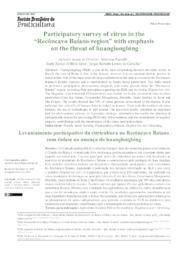Participatory survey of citrus in the 'Recôncavo Baiano region' with emphasis on the threat of huanglongbing.
Participatory survey of citrus in the 'Recôncavo Baiano region' with emphasis on the threat of huanglongbing.
Author(s): OLIVEIRA, G. S. de; FANCELLI, M.; SILVA, S. X. de B.; CARVALHO, S. R. L. de
Summary: Huanglongbing (HLB) is one of the most devastating diseases for citrus sector. In Brazil, the state of Bahia is free of the disease, however it is on constant alert to prevent its introduction. One of the main areas of citrus exploitation in the state is located in the Recôncavo Baiano?s identity territory and is characterized by family-based production. This study aimed to perform a participative phytosanitary diagnosis with citrus growers from the ?Recôncavo Baiano? region, recording their perception regarding the HLB and its vector, Diaphorina citri. The diagnosis, which featured 109 interviews, was carried out in five prominent cities in citrus production (Cruz das Almas, Governador Mangabeira, Muritiba, Santo Antônio de Jesus and São Felipe). The results showed that 70% of citrus growers never heard of the disease. It also indicated that only 6% of farmers have technical assistance. Even with the tradition of citrus farmers, the use of technologies is still limited. The presented results constitute an important tool for phytosanitary defense, as it provides strategic information that enable the planning of indispensable actions for preventing HLB entry in this territory, and also to minimize its negative impacts, contributing with the maintenance of the citrus production chain.
Publication year: 2021
Types of publication: Journal article
Unit: Embrapa Cassava & Fruits
Keywords: Doença de Planta, Fruta Cítrica, Praga de Planta
Observation
Some of Embrapa's publications are published as ePub files. To read them, use or download one of the following free software options to your computer or mobile device. Android: Google Play Books; IOS: iBooks; Windows and Linux: Calibre.
Access other publications
Access the Agricultural Research Database (BDPA) to consult Embrapa's full library collection and records.
Visit Embrapa Bookstore to purchase books and other publications sold by Embrapa.

